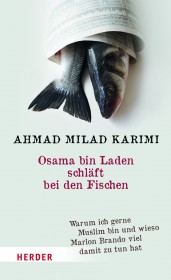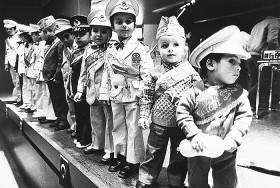“New German Stories,” an event series launched in January 2014 as part of the Academy program, continues this evening, 10 March 2015, when Ahmad Milad Karimi, Professor of Islamic Philosophy and Mysticism at the University of Münster, presents his new book Osama bin Laden is sleeping with fishes (Osama bin Laden schläft bei den Fischen) at the Academy of the Jewish Museum Berlin. We put three questions to our guest, prior to the event.

Ahmad Milad Karimi: Osama bin Laden is sleeping with fishes (Bookcover) © Herder Publishers
Julia Jürgens: Dear Mr. Karimi, in your autobiography you bring together Western popular culture and the history of Islamic intellectualism, the translation of the Koran and your PhD thesis on Hegel, Persian mysticism and a penchant for mafia films. If I may make a question of your book’s subtitle: What does Marlon Brando have to do with the pleasure you take in being Muslim?
Ahmad Milad Karimi: That is a secret of the book, a secret concealed first and foremost by the fact that there is always more to people than the pigeonhole we like to keep them in.
Six years ago you published your new translation of the Koran. What motivated you to take up such a challenge and add a new translation to those already in existence?
The Koran is more than simply a book—it is → continue reading
Purim is a family celebration, a time when children dress up, make a great din with rattles and gorge themselves on traditional Haman sweetmeats. By so much merriment it seems a little astonishing to recall that this religious holiday is actually rooted in a Bible story that is anything but happy and G-rated.

King Ahasuerus falls in love with Esther © photo: Shlomit Tulgan
The Book of Esther, which is read on Purim, tells of how the orphan girl Esther carries out a spectacular operation to rescue the Jewish people from the hands of King Ahasuerus, ruler of the Kingdom of Persia. The anonymous author recounts this story in the style of an epic poem and thereby suggests that God plays only a minor role in the proceedings. He turns the spotlight instead on the cunning with which clever Esther and her Uncle Mordechai manage to stop vizier Haman from realizing the pogrom he has planned against the Persian Jews. → continue reading
In some families the subject of circumcision provokes intense discussion, as you can see in the films that are part of our special exhibition “Snip it! Stances on Ritual Circumcision”. Oliwia is familiar with this difficult situation: on the one hand her Muslim husband considers it a natural part of the tradition, and on the other, particularly her Catholic father argues vehemently against it. Should she have her four-year-old son circumcised? What does she think of the practice herself? We spoke about these questions with Oliwia, as well as about her final decision.
Oliwia*, what different factors affected your family’s conflict over whether to circumcise your son?

“Boys before their Circumcision”, photo from the series “Turkish in the Ruhr district”, Cologne, 1983 © Henning Christoph / Soul of Africa Museum
My husband is Moroccan and Muslim. My background is Roman Catholic, although I converted to Islam in 2006. We had a son four years ago and from the beginning it was clear for my husband that Jamal would be circumcised. It’s a part of the tradition for him and it symbolizes a man’s identification with Islam.
It wasn’t so clear for you?
No. Actually, I’m → continue reading


